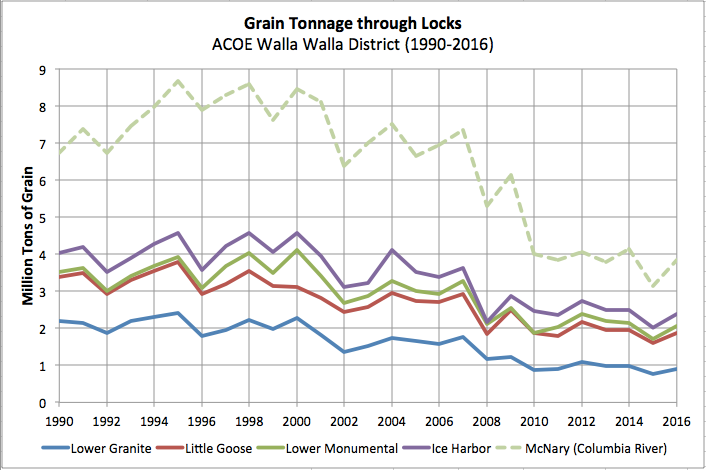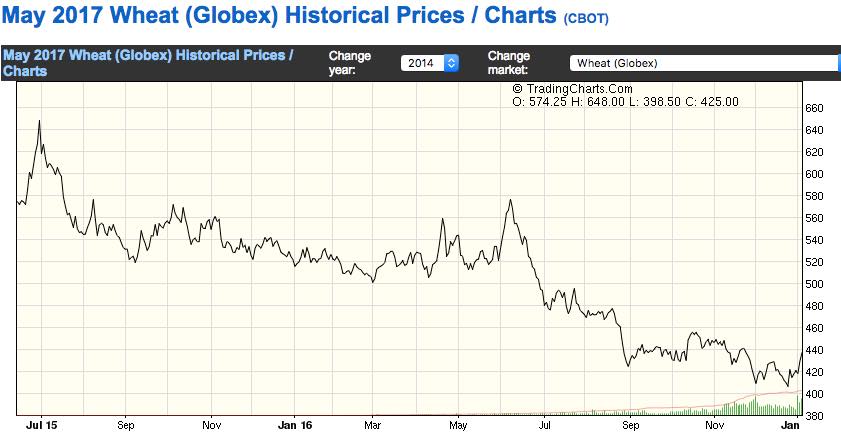forum
library
tutorial
contact

International Grain Prices
More Complex Than One Deal
by Lee Rozen
The Daily News, January 27, 2018
|
the film forum library tutorial contact |

|
International Grain Prices
by Lee Rozen
|
Japanese buyers could be looking at U.S. wheat at, say, $350 a ton
and Canadian/Australian wheat at $285 a ton.
 The Daily News reported Thursday that Japan has concluded a trade deal with Australia and Canada that would make their wheat cheaper in Japan.
The Daily News reported Thursday that Japan has concluded a trade deal with Australia and Canada that would make their wheat cheaper in Japan.
Japan is a huge customer for the club and soft white wheat grown on the Palouse and elsewhere in the Northwest.
If wheat grown here is suddenly more costly, local producers would likely lose customers and market share.
Scott Yates, Washington Grain Commission communications director, said, "Frankly, it would be devastating if we lost the Japanese market."
However true that may be, it doesn't appear the sky is actually falling, at least not yet. The deal takes place over nine years.
Yates' boss, Glen Squires, CEO of the WGC, said Japan still wants to buy U.S. wheat.
For good reason. There is a longstanding trading relationship - the U.S. is good at growing the kind of wheat Japan wants to buy, better than Canada and Australia have been. It will take them several years to figure out how to be as productive and efficient as the U.S. in growing wheat of the quality Japan wants in their climate and soils.
But money talks. A ton of grain is going for somewhat under $200. Japan has put a $150 tax on each ton coming into the country. The new deal cuts the tax for Canada and Australia by about $65 a ton. Japanese buyers could be looking at U.S. wheat at, say, $350 a ton and Canadian/Australian wheat at $285 a ton.
That, Yates says, "is a bridge too far."
Yates and Squires were critical of the Trump administration for pulling the U.S. out of the Trans Pacific Partnership, the structure under which the Canadian and Australian deals were negotiated.
But that is by no means the only factor affecting U.S. trade with Japan. For one thing, it now takes 21 more Japanese yen to buy a dollar's worth of U.S. grain than it takes to buy a Canadian or Australian dollar's worth of wheat - U.S. wheat could cost 38,140 yen and the Aussie's and Canuck's 25,050 yen.
And if the Port of Portland, Ore., stops loading oceangoing grain ships as seems likely, transportation costs to deepwater terminals in Tacoma, Wash., or Vancouver, B.C., will either raise the cost to the buyer in Japan or cut into profits of the grower on the Palouse.
Something to noodle about, eh?
Related Pages:
U.S. Must Rejoin TPP, Ag Policy Expert Says by Matthew Weaver, Capital Press, 1/31/18
Around 60 bushels to the ton, today's prices of $4.50 per bushel equate to $270 per ton.

learn more on topics covered in the film
see the video
read the script
learn the songs
discussion forum
